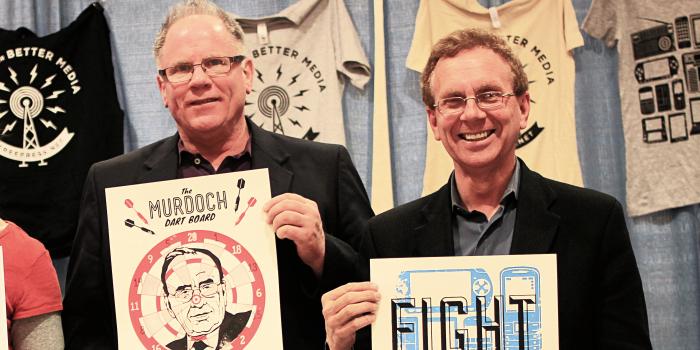Free Press and Allies Launch Three-Year Initiative to Transform Criminal-Legal Reporting in Philadelphia

PHILADELPHIA — On Wednesday, Free Press, the Media, Inequality & Change Center and Media Mobilizing Project launched the Philadelphia Organizing and Media Collaborative, a three-year initiative that will work to replace prevailing media narratives with complex stories about trauma, safety, crime and the legal system in Philadelphia.
Funded by a $2.6-million grant from the Independence Public Media Foundation, the collaboration will assess Philadelphia’s media landscape and uncover the various influences behind dominant narratives about race and crime. It will also reimagine and reinvent the way newsrooms approach crime reporting to center the needs and perspectives of people impacted by violence and the criminal-legal system — and de-emphasize the perspectives of law enforcement, which exerts too much influence over crime reporting.
“The three-year project aims to understand how social change happens, the media’s role in creating obstacles and opportunities for change, and what innovative, community-centered media and media making can and should look like in the region,” says the Independence Public Media Foundation.
Free Press will build on the successes of its News Voices project in Philadelphia, New Jersey and North Carolina, where the organization works to help residents have a stronger voice in how local journalism can be revived, strengthened and transformed.
Free Press’ News Voices director, Mike Rispoli, made the following statement:
“Time and again communities have told us that their biggest frustration with local news is the reporting on the criminal-legal system. News coverage that focuses disproportionately on crime and violence influences how the public perceives Black and Brown communities, the poor, and their own neighborhoods’ safety. Communities suffer when news outlets prioritize speed over context, police narratives over community perspectives, and sensationalist coverage over context-based or solutions-oriented reporting.
“We need to look at practices and structures within journalism to better understand how harmful stories around criminal justice even happen. So many factors go into this, from decisions about what’s newsworthy, to how reporters build and prioritize relationships with police, to how stories are told, and by whom, to the ownership and control of newsrooms, to the metrics outlets use to determine a story’s value.
“The Philadelphia Organizing and Media Collaborative will put forward innovative strategies and practices that both newsrooms and communities can adopt, not just in Philadelphia but in other newsrooms and communities across the country. We hope to offer a forward-looking vision for how media can be reorganized and restructured to better serve people who are too often neglected or misrepresented by the news.
“We’re especially pleased to be working in collaboration with the Media, Inequality & Change Center and Media Mobilizing Project, two long-term allies with years of dedication to building a more healthy, just and equitable Philadelphia.”




